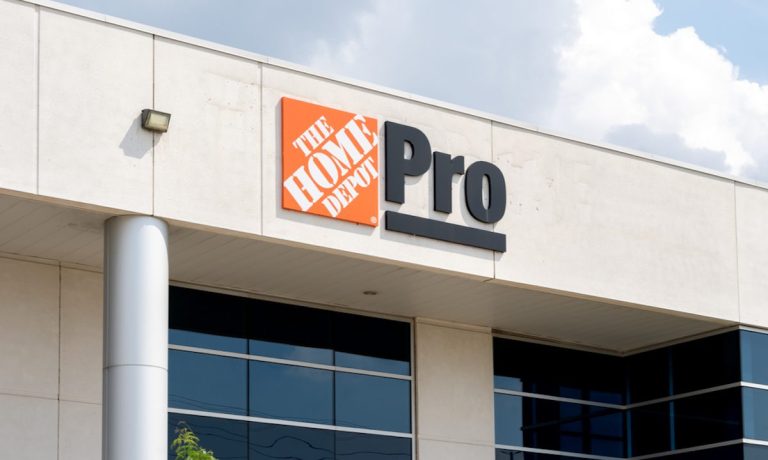Lowe’s, Home Depot Court Big-Spending Pro Contractors As DIY Takes A Breather

Consumers may be returning to in-person shopping and social activities, but the desire to upgrade their living spaces has continued, as many offices plan to remain closed through the remainder of 2021. After months of do-it-yourself (DIY) projects, though, it seems that consumers may have reached the limit of their abilities (or their patience for home repair) and are now turning to professionals.
“Consumers are taking on more projects,” Home Depot CEO Craig Menear said on a conference call with investors and analysts earlier this week. “They are larger projects, and [they] have a tendency to hire a pro to do them.” Home Depot’s professional business has outperformed DIY for two quarters in a row, Menear noted, with an ever-growing backlog of projects for consumers and professionals alike.
Related: Home Depot Customers Make Few Trips, But Buy Bigger Items
Dave Denton, Lowe’s chief financial officer, said the growth of the professional business is a continuation of consumers’ emphasis on the home. “Despite the fact that the U.S. market is opening up, you’re still seeing a large contingent of work-from-home and school-from-home, utilizing the home for activities other than just dwelling.”
Overall transactions are down at Home Depot, Lowe’s and Ace Hardware locations, the companies said this week in separate announcements, but each also noted an increase in average ticket size, driven in part by the volatility in the price of lumber in the second quarter. Additionally, Home Depot and Lowe’s executives said that in-store traffic has shifted, with weekday performance strengthening compared to weekends as consumers spend their Saturdays and Sundays elsewhere.
See also: Lowe’s Sales Sag Amid Decrease In Home Improvement
“Pro outperformed our original plan,” noted Lowe’s CEO Marvin Ellison. “We knew that we would see a greater shift to pro versus DIY based on what we saw in the first quarter. But the 21 percent comp and the 49 percent two-year comp is something that exceeds our original expectations.”
Among the departments with the strongest year-over-year comps, Home Depot Chief Operating Officer Ted Decker said, were kitchen, bath and lumber. Paint, hardware, and gardening — some of last year’s hottest home improvement categories — saw year-over-year declines.
An Upgraded Experience
About 5 percent of Home Depot’s customer base is made up of professionals, though they account for 45 percent of the home improvement retailer’s sales. Many of those professionals, Decker said, are part of Home Depot’s Pro Xtra loyalty program, which gives them access to special pricing and a new B2B website where they can create bills of material for jobs, get quotes, track receipts and quickly reorder items.
“This is just another great add to our pro ecosystem, and there’s been tremendous engagement with the pro loyalty app, the Pro Xtra program and the B2B website,” Decker said.
Likewise, Ellison noted that Lowe’s has about 25 percent penetration in the professional market and is working to improve that going forward. Part of the problem, the CEO noted, is that Lowe’s did not have a clear strategy for attracting pros over the past 10 years, though that has changed since Ellison took over in 2018.
For example, Lowe’s recently transitioned its Lowe’s For Pros program to the cloud and integrated it into the main Lowe’s website, which Joe McFarland, executive vice president of stores, said allows for enhanced features, faster updates and more personalized offers for professionals, such as rapid reorder on frequently purchased items.
“We are focused on making the pro shopping experience, both online and in-store, as easy and intuitive as possible,” McFarland said.
Impact of the Housing Market
Angi CEO Oisin Hanrahan told PYMNTS last month that as the pandemic has begun to fade, the home service professionals marketplace has seen consumers increase their demand for cosmetic upgrades in the home, including painting, flooring, kitchen renovations and bathroom remodels.
See: Angi CEO Says Consumers Shifting To Cosmetic Home Projects As Pandemic Wanes
Hanrahan said consumers are also thinking differently about their first homebuying experience as housing inventory has tightened, opting for larger homes that need work right out of the gate rather than small starter homes.
“That’s definitely changed the calculus for people on when to invest in home renovation, and I think people are doing more challenging work early on in their homebuying journey,” Hanrahan said. “And I think that’s a good thing. It’s exciting.”
Home Depot Chief Financial Officer Richard McPhail also noted a strong connection between home price appreciation and home improvement activity. Last week, online real estate marketplace Zillow projected that home values will grow by 12 percent over the next year, having already risen by 16 percent year over year in May. “And so, as we look forward, not only have we seen that home price appreciation, but the homeowner balance sheet is incredibly healthy,” McPhail added.